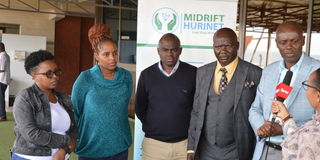Premium
Gangs and violence: Joblessness worsens Nakuru City’s insecurity problem

Joseph Omondi (right) the executive director of Midrift Hurinet speaks to the press in Nakuru City on August 1, 2023, accompanied by Shiko Kihika (left) executive director of Tribeless Youth, Ms Catherine Wanderi (Midrift Youth), Mr Walter Mwania (Midrift), Mr Were Simiyu, senior deputy county commissioner (Nakuru East).
What you need to know:
- No one from the security forces has been held accountable for the killings, and divisions still run deep, dividing many young people
- Ms Shikoh Kihika, 29, the executive director of Tribeless Youth, said the current youth gangs were mobilised by politicians during the last general elections and are now dormant
- Ms Kihika said the emergence of the dreaded ‘Confirm’ gang has created a strange and disturbing mix of terror in communities in Nakuru Town West and Nakuru Town East
When violence erupted in Nakuru City during the recent anti-government protests, the majority of demonstrators were youths.
Discontent among the youth had been simmering before the protests, sparked by rising taxes and the high cost of living.
The ongoing street battles were an opportunity for the depressed and demotivated youth to vent their anger.
The protests were perhaps the deadliest since the last general election.
At least three young people died as a result of police brutality during the anti-government protests.
In some parts of the city, increasingly violent armed gangs are vying for control of neighbourhoods, showing no fear or mercy.
“They’ve got no choice. They’ve got nothing else. The anti-government protests only fanned the flames as thousands of youngsters are jobless,” said Mr Peter Omondi, a resident of Kivumbini, a dangerous hideout for the notorious ‘Confirm’ gang.
The armed gangs are so daring that they carry out criminal activities in broad daylight.
No one from the security forces has been held accountable for the killings, and divisions still run deep, dividing many young people.
"It is as if the fate of our sons has been decided just because they are unemployed," lamented one mother who lost her son.
Nax Vegas, as Nakuru is popularly known by millennials and Generation Z, is Kenya's newest city and arguably the most cosmopolitan city in Kenya in every sense of the word.
It is often seen as the face of Kenya, as it has at least one representative of the 47 recognised communities.
If you want to visit a city with lots of different people from all over the country, Nakuru is the place to be.
The town was upgraded from a municipality to a city on December 1, 2021 by former President Uhuru Kenyatta.
Almost two years after the status change, young people have nothing to celebrate.
“I thought the city status would translate to a magnet for inward investment. I was optimistic that jobs and opportunities would follow. Nakuru City status doesn’t bring any lasting benefits,” said Mr Felix Kurgat, a Technical and Vocational Education and Training (TVET) graduate who is still unemployed three years after completing his electrical craft course.
“The truth is that Nakuru Industrial Area is as dead as a dodo and the bragging rights as Kenya’s newest city is not helping create employment for the youth,” said Ms Patricia Kamau, a hawker in the City.
“The city status is nothing more than a bauble,” said Ms Doreen Kemunto, a 29-year-old Bachelor of Commerce graduate who sells second-hand clothes in the Free Area slums.
“The problem with Nakuru City's status is that we still have high rates of joblessness and gang violence,” said Ms Pauline Kombo, a recent university graduate.

Joseph Omondi the executive director of Midrift Hurinet speaks to the press on October 2, 2023.
According to the 2019 Kenya Population and Housing Census Report, Nakuru City is the third most densely populated city in Kenya, after the capital Nairobi and the coastal city of Mombasa, with a population of over 600,000.
Nakuru City's greatest asset is its youth.
According to the 2019 census, Nakuru City has more young people than older people.
Nakuru County, with a population of 2.1 million, has a youth population of 67 per cent, or 1.4 million young people.
But this human resource is largely neglected and being destroyed by devolved corruption, which is stealing the dream of the youth.
“There is a general youth apathy in active involvement in the county governance and democratic processes,” said Ms Catherine Wanderi, a youth working at Midrift Hurinet.
She said the youth are to blame for avoiding participation in county activities that are crucial to uplifting their living standards.
“The youth avoid participation in county budget making, election, and policy-making processes on issues affecting them, including public participation,” said Ms Wanderi.
Ms Shikoh Kihika, 29, the executive director of Tribeless Youth, said the current youth gangs were mobilised by politicians during the last general elections and are now dormant.
“The youths have now been left to the dogs because the politicians no longer need them,” said Ms Kihika.
She added: “We created our own militias and now have armed young people who are hungry, angry, and jobless and don’t even know how to handle the weapons they have.”
According to Ms Kihika, the problem has been exacerbated by a society that has deliberately neglected the youth.
“The youth feel rejected and lonely. They are also very vulnerable and this results in the kind of violence we’re witnessing in Nakuru City today,” explained Ms Kihika.
Ms Kihika said the emergence of the dreaded ‘Confirm’ gang has created a strange and disturbing mix of terror in communities in Nakuru Town West and Nakuru Town East.
“The Confirm gang is a dangerous outfit that uses its intellectual property and innovations to kill and maim innocent residents,” she said.
“The gangs are using drones in a high-tech criminal mobilisation. If there are no right interventions we may end up the Haiti way,” Ms Kihika warned.
She added: “We must dialogue with these youths and provide them with a platform to articulate their issues. There must be fair employment of youth in Nakuru City.”
“Using force as a way of dealing with criminal activities will never work.”
Ms Zipporah Nyangara Mumbi, the executive director of Havens of Dreams, a community-based organisation that works to address intergenerational trauma, says the majority of youths involved in gang violence suffer from self-esteem issues and come from dysfunctional families.
“The youth are suffering from mental health challenges and want easy money and that is why they are engaging in violence,” says Ms Nyangara, a counselling psychologist.
The Senior Deputy County Commissioner in charge of Nakuru East, Mr Were Simiyu, said the government is determined to bring the gangs to heel.
“The police cannot fight gangs alone. They need to work with communities and non-governmental organisations like Midrift Hurinet to reduce criminal activities in Nakuru City,” said Mr Simiyu.
The youth blame the lack of opportunities on political corruption among the elite in the devolved unit.
“The influential powerbrokers are winning tenders like erecting perimeter walls of primary schools which could be done by youth group with skills,” said Mr Peter K’otieno, a resident of Kaptembwa slums.
“A strong cycle of poverty from parents to children is being repeated since the advent of devolution more than a decade,” said Mr Anthony Kamau, 30, a resident of the Kivumbini slums.
Mr Noah Tomno, 25, a youth in the slums of Kwa Rhonda, said: “We would like to be productive instead of engaging in drug abuse and alcohol but accessing government funds is limited to the regulatory framework and entrepreneurship education.”
“The other alternative is the Hustler Fund but many are not able to take the funds as they have no means to repay it and are among the biggest defaulters,” said Ms Naomi Kilundu, 34, a resident of London Estate.
According to Mr Joseph Omondi, the executive director of MidRift Hurinet, the increased gang violence is threatening the fragile peace and security situation in the city, which is a popular weekend destination.
“An overwhelming majority of those who participated in the anti-government street battles are young Nax Vegans,” he said. "What policymakers need are quick fixes on issues affecting youth as the young population, which is jobless, is striking back.”
“The young people have metamorphosed into deadly gangs and may soon become a permanent symbol for broader resentment and an open path to vent bottled-up grievances through organised criminal activities if their issues are not pursued,” Mr Omondi added.

Nakuru County Executive in charge of Sports, Gender, and Social Services Josephine Atieno Achieng speaks to the press in Nakuru City on August 1, 2023.
He warned that this could trigger another wave of violence in the city.
In an effort to address this challenge, Midrift Hurinet is working with three German agencies -- Deutsche Gesellschaft für Internationale Zusammenarbeit (GIZ), Deutsche Gesellschaft für Technische Zusammenarbeit (GTZ) and the Civilian Peace Service (CPS) -- to promote peace and social cohesion through a multi-sectoral youth-led dialogue on conflict mediation and violence.
“The main objective is to contribute to building safe, secure, and peaceful communities by creating a pool of youthful peace and security champions and increase communities’ resilience against gang violence, gender-based violence, and other forms of violence, including politically instigated violence and inter-communal conflicts,” said Mr Omondi.
Josephine Atieno Achieng, the Nakuru County Executive for Sports, Gender and Social Services, says the county has developed a youth policy to address youth unemployment.
She says the county has established a textile hub at Menengai Social Hall, a digital centre for the youth to market their products and innovations globally, a furniture hub in Naivasha, a packaging hub in Molo and a construction hub in Bahati.
“We want to give equal opportunity to all the youths and fix the unemployment issue through these hubs,” said Ms Atieno.





